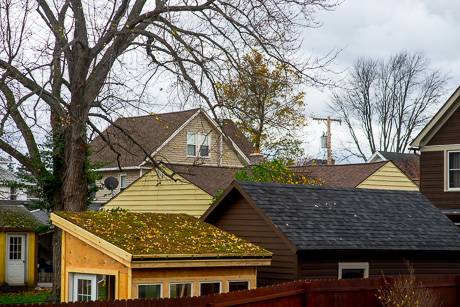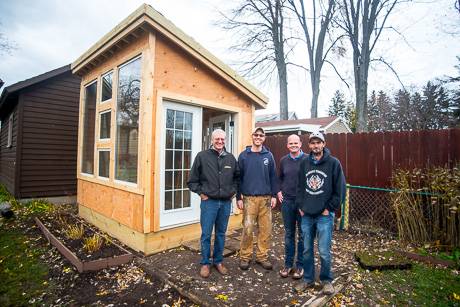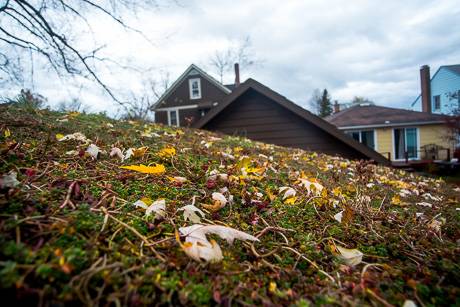
Batavia's landscape is changing, with more vegetable gardens, chicken coops and solar panels, and that's a trend the city would like to see continue, said City Manager Jason Molino while showing off his family's new greenhouse in the backyard of their home on Vernon Avenue.
Molino said code enforcement officers Ron Panek and Doug Randall report seeing more and more of these sort of backyard amenities, which is right in line with the city's strategic thinking about creating a more livable and sustainable environment, the kind of environment marketing studies and news reports show Millennials are seeking.
"This is just one example of what you can do," Molino said. "It shows how you can take your space and make it more livable and enjoyable for the whole family."
This particular greenhouse cost Molino a bit less than $900 to build, and the size of it required a city permit. But greenhouses can be built for a lot less and at a smaller scale so that no permit is required. As the city goes through its comprehensive plan review, one thing planners will be asked to consider is how to both streamline the process and protect the ability of residents to incorporate these sort of projects into their yards.
Every board, nail and pane of glass was locally sourced, Molino said, including the unique roof, which is a green roof grown right here in Batavia.
Comprised of several varieties of sedum, which is a plant that stores water and grows well in a wide range of climate zones, green roofs help insulate a building, control stormwater runoff (and thereby inhibit the flow of pollutants into storm drains) and improve air quality.
Vegetal I.D. is a company based in Batavia (the U.S. division of the French company Le Prieuré) that grows trays of sedum for green roofs on land leased from C.Y. Farms. The company's customer base, said Sander Teensma, is within a 500-mile radius of Batavia, which brings in a variety of climates where these sedum roofs thrive.
"This is an idea that is gaining momentum," Teensma said.
For the Molino family, the greenhouse is a project "that took on a life of its own," Jason said. For the past few years, the Molinos have been growing vegetables in their backyard, and as their children have gotten older, they've become more active participants in the process. It's a life-learning lesson the Molinos want to encourage. So they started talking about what they could do next -- more raised beds, a chicken coop, or perhaps a greenhouse.
Molino got his uncle involved and they started designing a greenhouse and finding sources of local material for construction. One thing led to another, and Molino decided a green roof would be perfect for the project, especially since there was a local company that could provide the roof.
And the whole project fits right in with the direction of the city's plan for a revised comprehensive plan that aims to focus on amenities and lifestyle choices for the up-and-coming generation of Americans who seek a life less defined by corporate dictates, more authentic in food choices and more environmentally conscious.
The comprehensive plan can help guide the city toward the kind of living environment people increasingly seem to be seeking so it doesn't lose out on the growth opportunity.
"We incorporate those ideas into the comprehensive plan so we advance the ideas and they can be done more easily," Molino said. "It helps market the community to capture a lot of the growth that's going to happen in the county over the next 10 years."
If projects such as STAMP are successful -- and the coming of 1366 Technologies is a hopeful sign -- then it should mean an influx of the kind of jobs Millennials will seek, then it's critical for Batavia to position itself as a livable community for those workers, or risk losing most of them to Buffalo or Rochester.
"The comprehensive plan reflects the values we want to see in the community over the next five to 10 years," Molino said. "We want to encourage and make it easier (to build these sorts of projects). If these are the amenities and quality-of-life features that people want, and we're seeing a trend when they buy homes and properties, how do we ensure that we can continue that trend and how can we build off of that? That's what the comprehensive plan does."

Craig Yunker, of C.Y. Farms, Jason Molino, Sander Teensma, and Paul Brent, production manager for Vegetal I.D.

